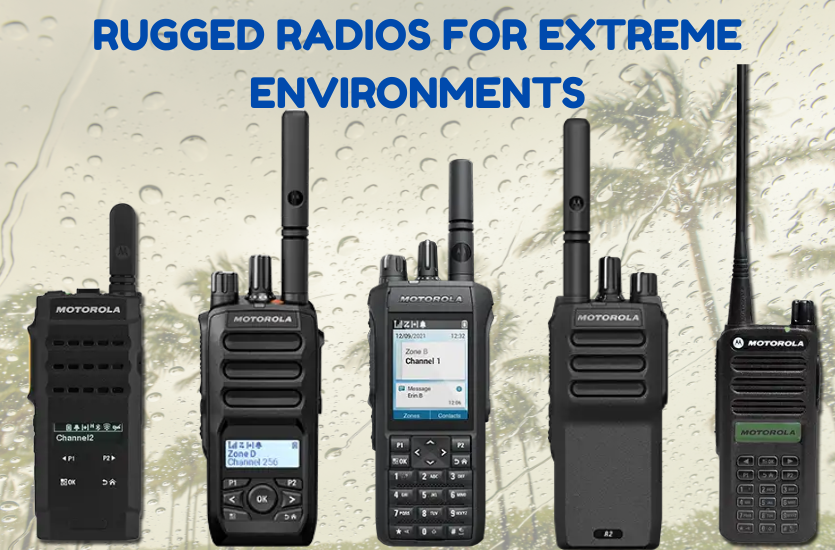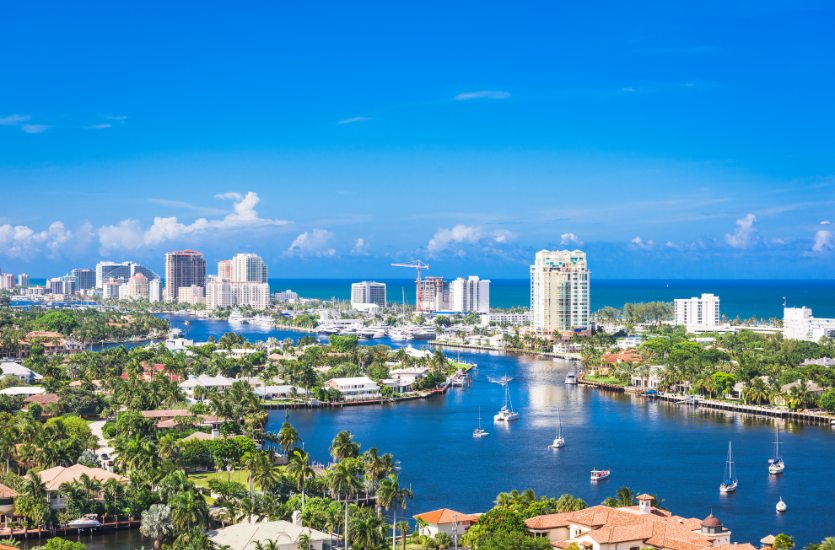There is a reason that we love to live and work in Florida. The sound and smell of the ocean. The palm trees. The sunshine. And of course, the warmth that envelops is year-round. But for Florida businesses that rely on two-way radios for communication, that weather doesn’t always work in our favor. The heat, humidity, coastal salt air, and jobsite dust can wear down even the toughest equipment, creating a demanding environment for both people and technology.
The thing is that two-way radios keep construction crews, utility workers, and marine teams connected every day, but not all radios are built to handle these elements. That’s where IP ratings and MIL-STD testing come in, giving users a clear way to measure durability and performance. Let’s look at what these ratings mean, and why they matter when you’re working in Florida’s toughest conditions.
Understanding IP Ratings
For radios in extreme environments, rugged design isn’t just a bonus. It’s a necessity. That’s why IP ratings are so important. IP stands for Ingress Protection, a two-digit system that tells you how well a device is sealed against dust and water. The first number measures protection from solid particles like dirt and sand, while the second measures protection from moisture, ranging from light rain to full submersion.
For example, a radio with an IP67 rating is fully protected against dust intrusion and can safely operate after being submerged in about one meter of water for up to 30 minutes. It’s a quick, reliable way to know how tough your equipment really is before taking it into the field.
Here’s a look at how common IP ratings stack up in daily use for both two-way radios and mobile phones:
- IP54: Protected from limited dust and water splashes—fine for light indoor or occasional outdoor work.
- IP65: Dustproof and resistant to low-pressure water jets, ideal for construction and maintenance sites.
- IP67: Fully dust-tight and waterproof up to one meter—great for fieldwork and marine crews.
- IP68: Dust-tight and resistant to continuous immersion beyond one meter—built for the toughest outdoor jobs.
IP ratings aren’t just technical jargon, either. They’re a safeguard for communication reliability. For construction crews, utility teams, and marine operators, choosing the right IP rating means dependable performance even when debris, salt air, and heavy rain are part of the daily routine.
What MIL-STD Testing Means
Now that you’re up to speed on IP ratings, let’s talk about MIL-STD testing and what that means for radios in extreme environments. Specifically, MIL-STD-810G and its updated version, MIL-STD-810H, were developed by the U.S. Department of Defense to evaluate how equipment performs under harsh environmental conditions. These standards test durability in a lab and simulate real-world scenarios that military and commercial users face every day.
Under these standards, equipment is subjected to a wide range of stress tests designed to mirror the extremes of daily use. That includes:
- Temperature shock: Rapid shifts from hot to cold to check structural and electronic stability.
- Humidity testing: Continuous exposure to high moisture to test resistance to corrosion or component failure.
- Vibration testing: Simulates movement from vehicles, boats, or heavy machinery.
- Drop and impact testing: Evaluates whether devices can survive falls, bumps, or rough handling.
- Salt fog testing: Exposes devices to corrosive salt air—especially relevant for Florida’s coastal conditions.
Motorola and other leading manufacturers used by EMCI Wireless follow these rigorous testing protocols to confirm their radios meet or exceed military-grade reliability. These aren’t just controlled lab exercises; MIL-STD testing is meant to represent how the equipment will perform throughout its entire life cycle, from storage and transport to daily operation.
In practice, radios that pass MIL-STD testing don’t just survive. They thrive in real conditions. Whether it’s a utility team working near transformers in peak summer heat, a construction foreman coordinating across a dusty site, or a marine crew managing communications offshore, these radios continue to deliver clear, dependable performance where it matters most.
Heat: Florida’s Constant Battle
Anyone who’s spent a summer day outside in Florida knows how intense the heat and humidity can get. What feels uncomfortable for people can be downright punishing for electronic equipment. High temperatures and moisture don’t mix well with batteries, screens, and internal circuits, especially when those devices are used daily on job sites or out on the water.
Florida ranks as the second most humid state in the U.S., with an average relative humidity of 74.5% and an average dew point of 62.7°F. For those who could benefit from a quick science-class refresher, relative humidity measures how much moisture the air holds compared to its maximum capacity, while dew point indicates the temperature at which that moisture condenses. The higher the dew point, the muggier it feels, and the harder it is for heat to dissipate from both people and electronics. In short, the same thick air that makes it hard to cool down also traps heat inside radio casings and batteries.
Rugged radios are built specifically to withstand these extremes. Sealed casings prevent moisture and condensation from seeping into sensitive components. High-temperature battery cells maintain performance even when exposed to prolonged heat. Many models also feature venting systems that equalize internal pressure without letting in humidity. Radios like the Motorola APX Series and MOTOTRBO radios are engineered with these factors in mind, making them reliable tools for Florida’s year-round heat and humidity.
Quick Tips for Managing Radios in High Heat
Even the toughest radios in extreme environments need a little extra care to keep performing at their best. A few simple habits can make a big difference in helping your equipment stand up to Florida’s relentless heat and humidity.
- Avoid leaving radios in direct sunlight for long periods.
- Use accessories designed for high-heat operations, such as vented holsters or breathable carrying cases.
- Charge radios in shaded or temperature-controlled environments when possible.
- Regularly inspect battery contacts for corrosion caused by moisture buildup.
Dust and Debris: The Invisible Enemy
Anyone who’s ever dusted a shelf or changed an air filter knows how quickly fine particles can accumulate. At home, dust can irritate allergies, clog vents, and affect the performance of electronics. Now imagine that same buildup happening daily on a job site, only multiplied by heavy machinery, dry soil, and concrete dust.
For construction, mining, and public works crews, dust isn’t just a nuisance. It’s a constant threat to equipment. Fine particles can work their way into microphone ports, speakers, and buttons, leading to muffled audio, sticky keys, and long-term damage. That’s why rugged two-way radios rely on sealed housings and membrane keypads designed to keep debris out while still allowing for clear communication and reliable operation.
IP ratings play a major role here, too. Radios rated IP65 through IP68 are built to prevent particulate intrusion, keeping dust from damaging sensitive components. The higher the first number in the IP rating, the better the dust protection, a super important factor when working in gritty, windblown conditions.
To keep this equipment performing like new, EMCI Wireless offers maintenance agreements for two-way radio systems that include cleaning, inspection, and repair. Regular service helps extend the lifespan of your investment, ensuring that your radios stay dependable no matter how dusty the job gets.

Water, Salt, and Humidity: The Florida Factor
From sudden afternoon downpours to ocean spray, Florida’s moisture-heavy climate is as unpredictable as it is relentless. The state averages around 54 inches of rainfall each year, with the wettest conditions often found in the Panhandle and along the southeastern coast. For those working near the shoreline or on the water, keeping communication gear dry can feel like a full-time job. Salt air doesn’t just coat surfaces. It accelerates corrosion, wearing down metal contacts, charging ports, and speaker grilles over time. Even inland, high humidity and frequent storms add another layer of strain to equipment that’s already working hard.
That’s where rugged, water-rated radios prove their worth. Models with IP67 or IP68 ratings are sealed tight to prevent water intrusion, allowing them to handle submersion and repeated exposure to rain or spray. This level of protection is indispensable for marine crews, utility workers, and storm response teams, where soaking conditions are part of the routine.
Beyond the radios themselves, corrosion-resistant materials and waterproof accessories, like remote speaker mics, protective cases, and sealed chargers, help extend the lifespan of communication gear. EMCI Wireless provides radios designed specifically for these demanding Florida conditions, backed by service plans that keep devices performing in all weather. Whether you’re repairing lines after a summer thunderstorm or managing logistics from the deck of a boat, the right waterproof setup keeps your team connected through every squall and surge.
Choosing the Right Radio for Your Industry
No two jobs face the same environmental challenges, and your radios shouldn’t either. The ideal setup depends on where you work and what your team faces each day. A construction crew battling concrete dust has different needs than a utility worker repairing lines in the rain or a captain coordinating from a dockside control room. Here’s a quick look at what to consider:
- Construction: Choose radios rated IP65 or higher and certified under MIL-STD testing to handle dust, debris, and frequent drops. These are built to survive heavy use and still deliver clear communication in noisy, fast-paced environments.
- Utilities: Look for radios that are both heat- and moisture-resistant, with strong, consistent audio quality. Clear communication is key when working near power sources or during weather-related outages.
- Marine: Go with IP67 or higher ratings and salt fog resistance to prevent corrosion and damage from spray or high humidity. Equipment designed for marine environments keeps communication reliable even on rough seas.
At EMCI Wireless, helping customers match the right radio to their environment is part of what we do best. From rugged handhelds to specialized accessories like waterproof mics and extended-life batteries, our experts help ensure your team stays connected, no matter where the job takes you.
Radios in Extreme Environments: Built for Florida’s Toughest Conditions
As we’ve shared, and as you know, Florida’s environment can be unforgiving. Heat, humidity, dust, and saltwater constantly test both people and equipment. But today’s radios in extreme environments are designed to meet those challenges head-on. Through advanced sealing, thermal protection, and military-grade testing, rugged models deliver reliable communication where it matters most. EMCI Wireless provides super-strong, built-to-last, field-tested radios and accessories built for real-world conditions across construction, utilities, and marine industries.
Whether you’re knee-deep in a construction project or out on the water, we have the radio solutions that keep your team connected, no matter what nature throws your way. Request a quote today.

